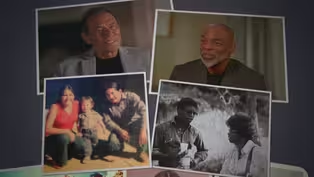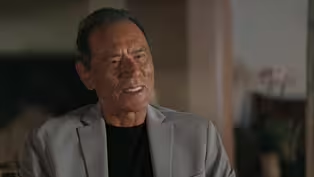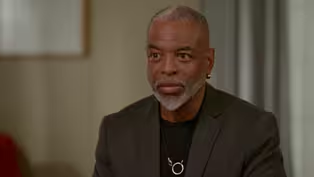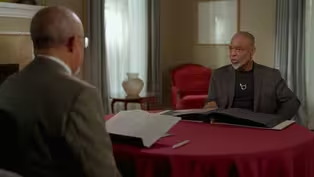Finding Your Roots
Wes Studi's Discovers His Connection to the Trail of Tears
Clip: Season 10 Episode 3 | 7m 34sVideo has Closed Captions
Wes hears the story of his how his ancestor journeyed on the Trail of Tears.
Wes hears the story of his how his ancestor journeyed on the Trail of Tears, which was a forced displacement of about 60,000 Native Americans, including Cherokee, Choctaw, Chickasaw, Creek, and Seminole tribes, from their homelands to Indian Territory (present-day Oklahoma) in the 1830s.
Problems playing video? | Closed Captioning Feedback
Problems playing video? | Closed Captioning Feedback
Corporate support for Season 11 of FINDING YOUR ROOTS WITH HENRY LOUIS GATES, JR. is provided by Gilead Sciences, Inc., Ancestry® and Johnson & Johnson. Major support is provided by...
Finding Your Roots
Wes Studi's Discovers His Connection to the Trail of Tears
Clip: Season 10 Episode 3 | 7m 34sVideo has Closed Captions
Wes hears the story of his how his ancestor journeyed on the Trail of Tears, which was a forced displacement of about 60,000 Native Americans, including Cherokee, Choctaw, Chickasaw, Creek, and Seminole tribes, from their homelands to Indian Territory (present-day Oklahoma) in the 1830s.
Problems playing video? | Closed Captioning Feedback
How to Watch Finding Your Roots
Finding Your Roots is available to stream on pbs.org and the free PBS App, available on iPhone, Apple TV, Android TV, Android smartphones, Amazon Fire TV, Amazon Fire Tablet, Roku, Samsung Smart TV, and Vizio.
Buy Now
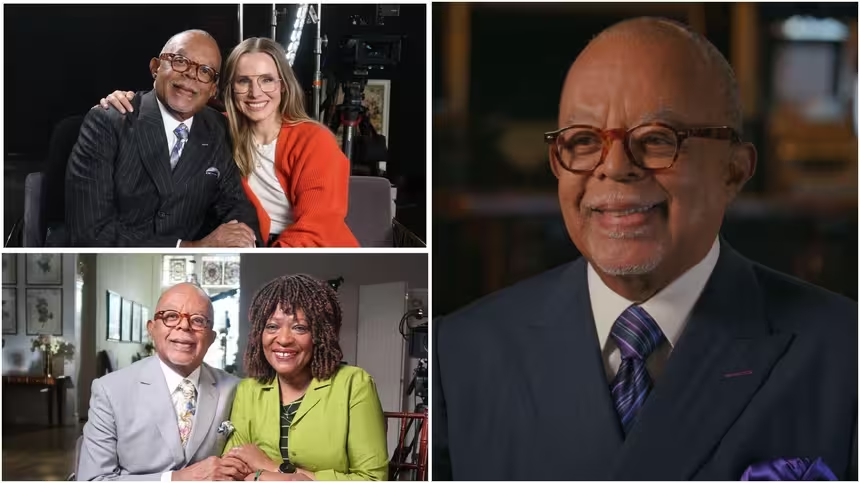
Explore More Finding Your Roots
A new season of Finding Your Roots is premiering January 7th! Stream now past episodes and tune in to PBS on Tuesdays at 8/7 for all-new episodes as renowned scholar Dr. Henry Louis Gates, Jr. guides influential guests into their roots, uncovering deep secrets, hidden identities and lost ancestors.Providing Support for PBS.org
Learn Moreabout PBS online sponsorshipWe'd already traced Wes Studi's paternal roots back to a heroine of the Cherokee Nation.
Now turning to his mother's ancestry, we focused on an event that transformed every family in that nation, the Trail of Tears, the forced removal beginning in 1830 that drove roughly 60,000 Native people from their homes in the Eastern United States to unknown territory in the West.
It's a tragedy that Wes has long struggled to comprehend.
So when did you learn about the Trail of Tears?
How old were you?
- High school, probably.
- Mm-hmm.
I would've been 13, 14 years old.
Yeah.
Do you remember what your reaction was?
Shameful.
I was ashamed that it had happened to us that way, you know?
I felt that I was ashamed of it.
"How did we let that happen?"
is my reaction.
Wes told me that these feelings ultimately evolved into a kind of curiosity.
He studied the Trail of Tears in detail, even reading firsthand accounts written by survivors.
But the names of his own ancestors, who had endured the ordeal, had been lost.
And at first, we couldn't find them either.
Then, one of our researchers uncovered an application for Cherokee membership filed by Wes' great-grandmother in Oklahoma in 1906.
It lists the names of Wes' family all the way back to the early 1800s, and places them in a very significant location.
"Nancy Catcher, grandmother.
Where were they born?
In the Cherokee Nation, state of Georgia."
In the Cherokee Nation, state of Georgia.
Wes, you just met your maternal third great-grandmother, brother, your great-great-great-grandmother.
Oh.
Her name was Nancy Catcher, also known as Big Nancy.
You ever hear of her?
No.
And you noticed where she was born?
Yeah.
Learning Nancy's birthplace unlocked the story of how she experienced the Trail of Tears, leading us to a claim that she submitted to the United States government in 1842.
Thousands of claims like this one were filed by Indigenous people, seeking compensation for what had been taken from them by white settlers.
"One steer, three years old, two yearlings, one horse, whole amount, $187."
What's it like to see this in black and white?
You know about it in the abstract, but what's it like to see an actual case involving your actual ancestor and what she actually lost?
Well, it... Well, it pisses me off, it always has.
But this, it's more...
It's more succinct, now I know where it was.
And I wonder if the people are still there who took over her place.
I'm sure they are.
Might be worth a trip.
Nancy's claim not only describes the property she owned, it also names the group or detachment with whom she traveled west.
There were more than a dozen such detachments, but Nancy's was led by the Principal Chief of the Cherokee Nation.
And with that information in hand, we were able to map the precise route that she took, a journey that stretched over 700 miles, allowing Wes to engage with what his ancestors were forced to endure.
I've been to some of the places that she passed through.
Hmm.
I've been to many of these places, seeing them, and I don't know.
Let's see.
Yeah, yeah, it's... That's the most northern route and it was in the wintertime.
Yeah.
They waited until the ground was a little more frozen and easier to walk on, rather than mud.
- Yep.
- In a lot of places.
And she was in her late 20s or early 30s when she made that journey.
What's it like to see that, to know the actual route?
It's good to know.
It's good to know particulars and have a real story about how we got to where we are because, a lot of our family has been doing this genealogy thing and trying to figure out this and that, and so I'm bringing a wealth of information, thanks to you and your program there, too.
Good.
And I know it's gotta be painful.
Well, we've lived with that pain for a long time.
Yeah.
So it's not something that stabs at the heart right now, you know?
We had a final detail to share with Wes.
Nancy arrived in Oklahoma in February of 1839.
12 years later, she appears in what's known as the Drennen Roll, the first record enumerating the Cherokee Nation in the west.
And the family is living just 10 miles from where Wes' mother would be born almost a century later.
What do you think your mom would've made of all this?
I think she would just have been... She would've said something like, "I'm sorry, they didn't tell me this."
Yeah.
And I can kind of echo that, you know?
- Well.
But I'm glad we found out something.
But let me ask you the obvious question.
Why do you think these stories weren't passed on?
Well, these days, it's called colonization, socialization, assimilation, a survival.
Essentially survival.
And all of the other things go along with it because they made this trip...
This family of people right here made that trip in order for me to be sitting here talking to you.
I mean, there's that idea of the coming generations that you have to keep in mind.
Yeah.
For your own people to continue to be.
Right.
Ultimate urge is to survive.
- Ultimate urge.
- Yeah.
Video has Closed Captions
Preview: S10 Ep3 | 30s | Henry Louis Gates, Jr. introduces LeVar Burton & Wes Studi to families they’ve never known (30s)
How Wes Studi Got Into Theater
Video has Closed Captions
Clip: S10 Ep3 | 1m 22s | Wes Studi says he joined a theater company in Tulsa to meet new people after his divorce. (1m 22s)
Levar Burton Reflects Proudly on "Reading Rainbow"
Video has Closed Captions
Clip: S10 Ep3 | 1m 4s | Levar Burton cites hosting and producing "Reading Rainbow" as his proudest achievement. (1m 4s)
Levar Burton's Emotional Connection to His Ancestors
Video has Closed Captions
Clip: S10 Ep3 | 4m 57s | LeVar Burton becomes emotional when he learns about his ancestor's connection to education (4m 57s)
Providing Support for PBS.org
Learn Moreabout PBS online sponsorship

- History
Great Migrations: A People on The Move
Great Migrations explores how a series of Black migrations have shaped America.












Support for PBS provided by:







